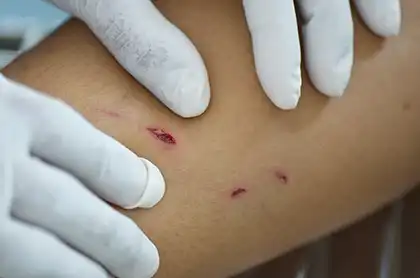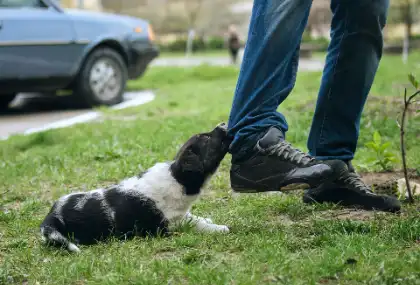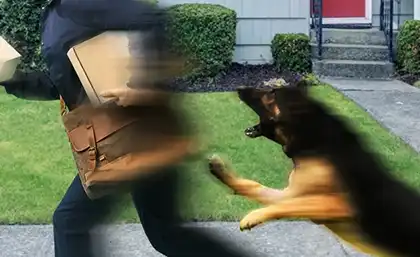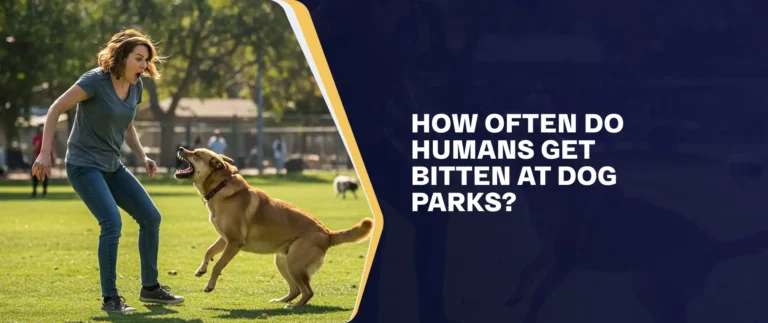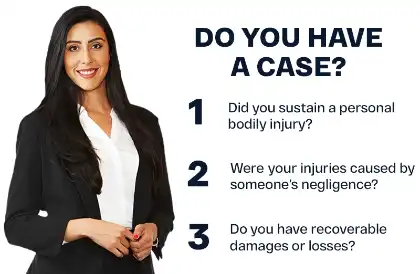Table of Contents
The term “lifelong friend” is often used to describe dogs. Unfortunately, even the friendliest pets can turn into a potential threat. Whether intentional or not, dog bites can happen anywhere at any given time. When it does occur, victims and owners should know how to report the incident.
Dog bites are often unpredictable, owing to the fact that these animals, particularly those neglected by their owners, can be quite unpredictable themselves. Dog attacks usually happen when the dog experiences extreme fear or pain. It might also attack if they feel the need to protect something, like their home, puppies, human family members, or food. Additionally, dogs may bite when overexcited while playing with other animals or when their surroundings overstimulate them.
Dogs in these triggering situations might be aggressive toward people, causing bodily injuries, emotional trauma, and even legal consequences. Dog bite victims in San Diego County may be able to hold pet owners accountable by reporting the dog bite to the right government agency.
How Do I Report A Dog Bite In San Diego?
Report a dog bite incident promptly to the County of San Diego Animal Services by following these steps:
Call The Emergency Hotline
For serious dog bite cases and serious incidents, contact 911 immediately. You can also directly call (619) 236-2341, the hotline for San Diego’s 24/7 animal services office. A team of first-aid responders will act on your situation quickly and provide the medical treatment you need.
Avoid sending an email if you need immediate help.
If the emergency has passed, you can also take the following steps to report a dog bite:
- Fill out their online form.
- Visit their animal control offices in various unincorporated towns and cities. Their usual hours are 10:00 AM to 4:00 PM, Mondays through Fridays.
Provide Relevant Information
When reporting a dog bite accident in San Diego County, provide crucial information like the date, time, and location of the attack. If you have any photos or videos related to the incident, sharing them with the authorities can also help them understand the situation. These visuals can provide important information about the dog’s physical characteristics, behavior, and the events leading up to the attack.
The animal control office will also need other information to create an incident report, including important details about the:
- Dog Owner — Officers need the following information to verify the details of the incident, confirm their ownership, and investigate further:
- Name
- Address
- Phone Number
- Dog That Bit You – Having these details would help the investigation proceed more efficiently:
- Breed
- Sex
- Name
- Color
- Age
However, many victims aren’t knowledgeable about dog breeds, and some don’t stick around to find out things like the dog’s name and age.
At the very least, you can provide basic information like the dog’s size, the characteristics of its coat, the color, and other features you might have noticed. This will help the investigators find the dog if you don’t know who the owner is.
Present Witness Testimonies
Presenting witness accounts may help support your report of the dog attack in San Diego County. Eyewitnesses can help establish the circumstances of the incident, identify the dog and its owner, and provide details of the ensuing events.
Having witnesses can be beneficial, especially if there are disputes among the involved parties. They can also support your claim if the incident leads to a lawsuit.
Note Down The Record Number
After finishing your report, take note of the record number assigned to your case. You can also ask for the name of the animal control officer who assisted you. You may use these details to ask for updates about your report.
What If A Stray Dog Bit Me?
Not all dogs walk with an owner. Many of them are wandering freely in the streets and alleyways. If a street dog bit you, you can still make a report with the following information:
- The dog’s physical characteristics (size, color, fur, etc.).
- Where, when, and how the attack happened.
- Photos and videos of the dog and the location where the attack occurred.
It’s possible that no one would want to claim ownership of the dog. Regardless, coordinate with the authorities to help track down the owner if the dog has one. They usually do this by obtaining government records and the testimonies of witnesses.
Thorough investigations can help identify potentially liable parties. Even street dogs might have handlers who are temporarily or permanently responsible for them. Depending on the circumstances, you may be able to hold the following parties responsible:
- Animal shelters that allowed the dog to escape.
- Pet-sitters who were supposed to watch the dogs while their owners were away.
- Property managers who allowed their tenants’ dogs to run free.
- Concerned citizens who feed or pamper stray dogs.
Determining the owners of the dog that bit you is important if you decide to pursue a legal claim.
What Is Considered A Dog Bite?
Dog bites don’t need to break the skin or draw blood to be considered as such. In court rulings within the state, victims may be able to seek compensation as long as they are able to demonstrate that the animal closed their jaw around a body part. We can refer to the dog bite scale developed by Dr. Ian Dunbar, a renowned veterinarian. It encompasses six levels:
- Level 1 — The dog displays “obnoxious or aggressive” behavior without biting.
- Level 2 — The dog bites with its teeth, but doesn’t pierce the skin, and nicks and slight bleeding might be present.
- Level 3 — One dog bite causes one to four punctures and penetrates the skin not deeper than half the length of the dog’s canine teeth.
- Level 4 — One dog bite leads to one to four punctures and penetrates the skin deeper than half the length of the dog’s canine teeth. It may also result in bruising around the wound.
- Level 5 — The dog bites or attacks a victim multiple times, resulting in one or more wounds with varying degrees of penetration. There must be a Level 4 bite in each instance.
- Level 6 — The dog attack results in the death of a victim.
Levels 1 and 2 account for 99% of dog bite accidents. These incidents are often the result of fear and rough play. According to Dr. Dunbar, dogs that display these behaviors can usually be trained and disciplined. The same applies to level 3 cases, although training may take longer.
However, those that cause level 4 to level 6 injuries are already considered very dangerous. These animals have poor bite inhibition, which means they are unable to control the strength of their bite. At this stage, training is usually not an effective option. In severe cases, the animal control office may recommend euthanasia.
Dog Ownership In San Diego County
San Diego County is known as an animal-inclusive place. The San Diego Humane Society has different programs aimed at nurturing human-animal bonds. It educates its communities about proper animal treatment while also assisting families who keep pets, like dogs.
For years, the place has provided lifesaving care to over 40,000 animals, of which 12,612 are wildlife. It also welcomed 44,483 animals, placed 29,474 pets in new homes, and addressed 38,696 animal-related calls. Given its relevant efforts to maintain a safe community for animals, it’s no wonder that pets, especially dogs, continue to thrive in the county.
Currently, San Diego County features several off-leash parks where pet owners take their dogs for walks without any restraints, such as:
- Nobel Leash-Free Park in La Jolla.
- Maggie Houlihan Memorial Dog Park in Encinitas.
- Alga Norte Dog Park in Carlsbad.
- South Buena Vista Park in Vista.
- Montevalle Recreation Center in Chula Vista.
Residents also enjoy strolling with their furry buddies on the shores of Ocean Beach, Mission Bay, Coronado, and Del Mar.
Considering the availability of dog-friendly spaces, dog bite reports have also increased. Attacks can happen anywhere; you can get bitten at a dog park, along the street, in a store, or even inside someone’s home.
In early 2024, San Diego’s emergency services responded to a call at a residence in City Heights, where a pitbull bit its owner’s nephew in the face. In Oceanside, a beloved school custodian was attacked outside his home, sustaining serious injuries.
It is also important to note that dog bite incidents can affect anyone, including young children and law enforcement officers.
Who Should Report Dog Bites?
Reporting dog bites isn’t only the responsibility of one individual. Under California law, the following parties must also notify animal control officers about dog bite accidents:
- Dog Bite Victims — The dog bite victim should report the incident to the local animal control agency immediately. This facilitates proper treatment and helps hold the dog owner accountable for their pet’s actions.
- Dog Owners — The liable person, the dog owner, must also let the health officers know about the same incident. If they don’t make a report, they may be found guilty of a misdemeanor in accordance with San Diego County Code Article 62, Section 615.
- Medical Professionals — The Code of Regulations Title 17 Section 2606 explicitly mandates healthcare professionals to inform the relevant local health departments or animal control agencies about dog bites, especially in areas with reported cases of rabies.
With the implementation of dog bite laws, San Diego County hopes to contain the spread of rabies and safeguard public health. It also helps the government enforce additional preventive efforts to reduce the number of dog bite cases.
Do Dog Bites Need To Be Reported In California?
Yes, you must report dog bites and animal attacks to the agency handling these cases. Still, some individuals choose not to report dog bites in San Diego County. For example, many of them might want to avoid conflict with dog owners, who they may consider their friends or family.
However, reporting attacks is crucial not only in holding the owner accountable but also in keeping the entire community safe. You might be asking, “Why should I report if a dog bites me?”
One important benefit of reporting a dog bite is rabies control. It allows authorities to enforce quarantine rules to see if the dog has rabies. San Diego’s Animal Services might quarantine the animal in a facility of their choosing. In some cases, they allow the owner to isolate their pet at home instead. With these precautions, authorities can quickly implement safety measures if a dog is found to have rabies.
Moreover, the ensuing investigation can help identify any past cases of violence and law violations. If the dog’s history includes multiple attacks and other issues, it could be declared a “public nuisance animal” or a “dangerous dog.” When this happens, the animal might be impounded to keep the community safe.
Filing a dog bite report could also help uncover potentially concerning issues within the dog’s home. When an officer investigates, they might be able to discover cases of abuse, cruelty, or neglect, which are punishable by imprisonment or a fine.
Having an accurate account of dog bite cases enables San Diego County to make better public decisions. It might prompt the government to intensify certain laws, enact more rules, and address persisting issues, if any.
Other Steps To Take After Reporting A Dog Bite
Protecting your legal rights doesn’t necessarily end after you report a dog bite accident in San Diego County. It would also help to consider taking the following steps:
- Seek Medical Attention — If you haven’t already, go to the ER or visit the nearest center handling animal bite cases. Even if you don’t think that the attack drew blood, you still have to get checked. A dog bite can lead to infections and other serious medical conditions.
Medical professionals might prescribe antibiotics and a tetanus shot, especially if you haven’t had one in the past ten years. They might also recommend surgery if the wounds are deep and wide enough.
Most importantly, you might need to get rabies shots. For it to be effective, you should get the first one within 72 hours after the injury.
- Keep Documenting Your Injury — If you want to pursue a claim later on, you can keep comprehensive documentation of your injury, including:
- Photos & videos as visual proof of the severity and progression of your wounds.
- A copy of your medical report.
- The clothing that was torn during the attack.
- History of the dog.
- Follow Up on the Progress of Your Case — Use the case number to follow up on your case. You can ask if the responsible party has already coordinated with the animal control office, which they are required to do.
It can be helpful to follow up on the animal control office’s investigation to learn whether the dog is classified as vicious or potentially dangerous. This information may be useful if you choose to pursue legal action.
- Contact a Dog Bite Lawyer — One question dog bite victims commonly have is, “Do I need a personal injury lawyer in San Diego County?”
A law firm that has experience practicing this area of personal injury law can guide you through the applicable regulations. Our attorneys at Arash Law can also help you file a claim against the dog’s owner or other liable parties if you’re eligible to pursue compensation. Our dog bite lawyers can assist you in pursuing claims for losses or damages related to a dog bite incident.
Statistics Regarding Dog Bites
California and the entire United States are no strangers to dog bites. According to a study by the Insurance Information Institute (III), about 800,000 people require medical attention each year as a result of dog bites, which affect over 4.5 million people. According to the same report, dog bites and other dog-related injuries account for over one-third of all homeowner’s liability claim payouts.
Mail carriers are among the common victims. In 2020, the U.S. Postal Service revealed that over 5,800 of its employees were attacked by dogs while delivering mail.
The San Diego Animal Services office also examines more than 6,000 dog bites annually. These accidents lead to various injuries, like scratches, concussions, fractures, amputations, muscle tears, and disfigurement. These could require surgeries and treatments, depending on the severity. More severe dog attacks can potentially lead to the death of victims.
Important Resources For San Diego Dog Attack Incidents
County of San Diego Department of Animal Services – North Shelter
- Contact Number: (619) 767-2675
- Address: 2481 Palomar Airport Road, Carlsbad, CA 92011
- Hours: Tuesday to Sunday – 10:00 AM to 4:00 PM
County of San Diego Department of Animal Services – South Shelter
- Contact Number: (619) 767-2675
- Address: 5821 Sweetwater Rd., Bonita, CA 91902
- Hours: Tuesday to Sunday – 10:00 AM to 4:00 PM
Chula Vista Animal Care Facility
- Contact Number: (619) 691-5123
- Address: 130 Beyer Way, Chula Vista, CA 91911
- Hours: Tuesday to Friday – 10:00 AM to 5:00 PM
Saturday – 10:00 AM to 4:00 PM
- Phone: (619) 299-7012
- Email: info@sdhumane.org
- Mailing Address: 5500 Gaines St., San Diego, CA 92110
Camp Pendleton Animal Shelter
- Contact Number: (760)725-8120
- Address: Marine Corps Base, Camp Pendleton, CA 92055
- Hours: Monday to Friday – 10:00 AM to 4:30 PM
Saturday – 12:30 PM to 4:30 PM
Sunday – 10:00 AM to 4:30 PM
- Contact Number: (619)667-7536
- Address: 8085 University Avenue, La Mesa, CA 91942
- Hours: Monday to Friday – 8:00 AM to 4:00 PM
- Contact Number: (619)441-1580
- Address: 1373 N. Marshall Avenue, El Cajon, CA 92021
- Hours: Tuesday to Sunday – 10:00 AM to 5:00 PM
Coronado Animal Services
- Contact Number: (619)522-7350
- Address: 1395 First Street, Coronado, CA 92118
- Hours: Sunday to Monday – 9:00 AM to 11:30 AM and 12:30 PM to 4:00 PM
- Contact Number: (619)336-4478
- Address: 1200 National City Boulevard, National City, CA 91950
- Hours: Monday to Friday – 7:00 AM to 5:00 PM
Frequently Asked Questions
Can I Sue The Owner Of The Dog That Bit Me?
Yes. According to California Civil Code Section 3342, the owner of the dog is strictly liable for compensating the victim. As long as you were in a public place or legally in a private place when the incident occurred, you can file a claim.
How Much Can I Pursue For A Dog Bite?
Since every case is unique, there’s no way to determine the average payout for a dog bite. However, the potential value of your dog bite claim can depend on several factors, such as the extent of your injuries and the policy limits of the dog’s owner.
Can I Sue Even For A Minor Dog Bite?
Yes, you can sue even for a minor dog bite, but there must be some measurable harm or damages. If you’re unsure of whether you’re eligible to do so, you can fill out our “Do I Have A Case?” form here, and one of our legal staff will get back to you. You can also call us with any questions or concerns about your case.
Speak With Our Dog Bite Lawyers In San Diego
Victims of dog bites in San Diego County are required by California law to report the incident to the animal services office. However, reporting the accident may not address all the physical, emotional, and financial effects of a dog bite. If you wish to explore the possibility of pursuing a claim for your losses. Arash Law can explain your available legal options.
Our San Diego dog bite lawyers have years of experience handling dog bite accident cases. We are committed to helping injured clients pursue a settlement in accordance with California law.
Call our San Diego injury law firm at (888) 488-1391 for a free initial consultation. You can also contact us here.
We will respond as soon as we can. Our personal injury lawyers will review your legal grounds and assist you in filing a valid claim. If you choose to sign on as one of our clients, you won’t have to pay attorneys’ fees unless you’re awarded a settlement or a verdict, as we work on a contingency fee basis. However, other case-related costs may still be charged separately, regardless of the outcome of your case. We’ll discuss this with you before working on your case.
Our legal services are also available across California, including in neighboring locations such as Poway, Santee, Lakeside, Bostonia, El Cajon, La Mesa, Lemon Grove, Spring Valley, Rancho San Diego, Solana Beach, La Presa, Ramona, Escondido, and National City.


